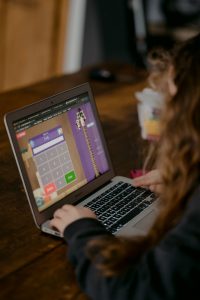![]() By Ryan Korstange, Middle Tennessee State University
By Ryan Korstange, Middle Tennessee State University
Originally published in The Conversation.
Even in normal circumstances, it can be hard to get motivated to do your schoolwork. But these are not normal circumstances.
The switch to remote instruction caused by COVID-19 has been unsettling. Patterns have changed. Habits have been disrupted. Remote classes are simply different from classes that involve face-to-face instruction.
As a researcher who looks at what it takes to get through college, I have a few tips that could maximize your motivation and productivity when you’re at home going to school online.

1. Guard your time
You do not need large amounts of time to be productive. Instead, be intentional and focused in short blocks where you can work without interruption. Protect these open times by setting up your workspace to minimize distraction – including silencing notifications on your cellphone or laptop. Communicate your boundaries to friends and family and make sure to identify times when work and socialization can happen.
2. Determine how much work is needed
Write down the work you need to accomplish, because there is a limit to how much information you can recall and process at one time. Examine the remaining projects, including research and written assignments, and estimate the amount and type of effort that each requires. Identify any tests and quizzes that are scheduled and determine what preparation is necessary.
3. Break large projects into smaller ones
Breaking big projects into smaller and more manageable tasks allows you to achieve maximum efficiency and effectiveness.
Your assigned tasks should follow a logical sequence. Some tasks are basic, like locating articles in the online library for a research paper. Others, like proofreading, are best left to do later in the process. Work steadily, and record your progress as you do, because you get more done when you can actually see the progress you’re making.
4. Set goals
When you set specific and difficult goals for your work and make them public in some way, it can boost your performance and enhance your motivation.
Setting generic, vague or easy goals is less helpful. Set goals related to effort. For example, plan to spend three hours one day studying for a certain class. Also, set goals related to the completion of specific tasks or products. For instance, give yourself a deadline to read and take notes on a specific article for a certain paper you must write.
Further, make time in your plan to deal with any interruptions and challenges that may occur. For example, when my 7-year-old gets bored or needs some attention and interrupts me in my work, I plan to spend 20-30 minutes doing something with her. We take a walk or a bike ride, or create some art. Then I can return to work. I even set a timer to keep myself honest.
5. Identify the rewards
It pays to clarify the rewards at stake this semester – whether those rewards are internal, such as the feeling of accomplishment that comes from understanding a difficult concept well, or external, such as getting a good grade.
Many universities are adopting pass/fail grading systems in the short term, so the external reward course grades provide will likely be different. Learning is what matters now. Focus on the course learning outcomes and make sure that you’re meeting them, because these skills will be the ones required of you as you progress toward your degree.
6. Be flexible and go easy on yourself
This is an unprecedented crisis, and we are all scrambling to make it work. You didn’t expect to spend these months at home, learning online. Some days won’t go as planed – and that’s alright. Forgive yourself when you don’t do your best, then move forward and overcome the setbacks.
When the pandemic passes
Eventually, this pandemic will be over. Face-to-face classes will start again, and this semester will be but a memory. The good habits you build and the strategies follow now to manage to learn and work independently will bear dividends in the future.




